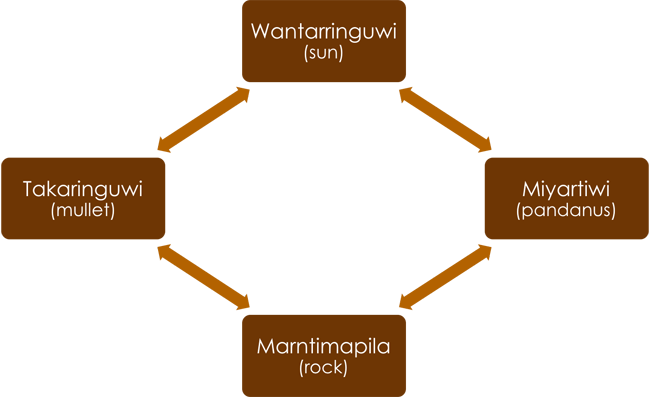Skin Groups
In Tiwi culture, the skin group system is matrilineal; it is inherited from the mother. Skin groups, or ‘yiminga’ represent important foundations for Tiwi life. Stemming from the marriage line the skin groups provide the ‘line of life’ incorporating totem, songs, dance, dreaming place, ceremony and relationships. The cultural elements are taught from birth so children grow up understanding the avoidance, familial and obligation relationships fundamental to Tiwi culture
There are four skin groups:
Wantarringuwi (sun)
Miyartiwi (pandanus)
Marntimapila (rock)
Takaringuwi (mullet)
The skin-group into which Tiwi is born determines who they may, and may not marry. For example, a person in the Wantarringuwi group can marry someone from the Miyartiwi or Takaringuwi groups, but never someone from the Marntimapila group, or from their own group.

Men or women in any given group can marry into the groups indicated by the arrows.
When young Tiwi choose partners they don’t choose randomly, but rather from within the permitted skin groups. When brothers and sisters reach puberty, they are not allowed to be alone together or even to sit together without a chaperone being present; these avoidance rules apply at school, when travelling and even in group photographs.
Even though the systems are strong in the minds of senior Tiwi people there has been a degree of breakdown in relation to the younger generations. Western culture over time has brought about change to many cultural elements. A more recent influence has been the prolific use of mobile phones and Facebook amongst young people, which has created a growing area of concern for cultural leaders. The technology allows easy access to the wrong brothers and sisters and the relationship boundaries have become more vulnerable to wrong doing. This can cause potential conflicts between families. Skin groups represent a structured system of rules that have been in place for tens of thousands of years and have served Tiwi people well. Tiwi elders believe it is important to ensure that these important cultural foundations are promoted and practiced to keep the community and culture strong.

